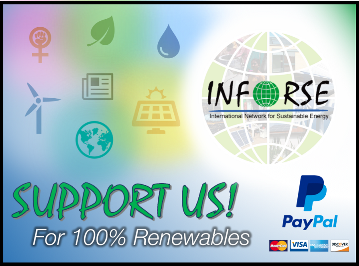|
|
|
|
|
|
|
|
|
|
|
|
|
|
|
|
|
|
|
|
|
| Follow Us: |
| Sustainable Energy, Environment & Development in South Africa | |
| By Rene Karottki, SEED South Africa /OVE Denmark | |
|
The South African government has set a goal of delivering and electrifying 1 million new houses by the year 2000. The government has also ambitious goals to improve energy services for rural communities, including electrification from renewable energy. The SEED (Sustainable Energy, Environment and Development) Programme was established to give sustainable energy, environment and development issues a more prominent place in these delivery programmes, and to strengthen local authorities, communities and NGOs in dealing with the issues at the local level. Phase 1 of the SEED Programme (1999 - 2001) is implemented in co-operation with the Danish Organisation for Renewable Energy (OVE), and is funded by the Danish Environment and Development Co-operation Programme (DANCED). In selected local pilot areas, SEED works closely with communities, local authorities, NGOs and other service providers to strengthen knowledge, create awareness, and demonstrate how the energy and environment issues can be tackled. |
|
| Sustainable Low-cost Housing | |
| In the urban pilot areas, SEED co-operates with local authorities and housing NGOs in Cape Town, Durban, and Gauteng (in and around Johannesburg), enhancing their capacity to help urban communities use safer, affordable, convenient, and environmentally sustainable energy options. The partner organisations are City of Tygerberg, Development Action Group, Durban Metro Housing, Built Environment Support Group, Midrand Local Council, and Earth Life Africa. Each of the partner organisations has employed a SEED Advisor that will be the hub for local-level activities. With technical and organisational backing from the programme, the advisors interact with housing schemes, conduct information campaigns, demonstrate different solutions and train local planners, service providers, and professionals. | |
| Rural Development | |
| In rural areas, SEED focuses on energy and environment issues in the context of rural development. The entry point is the end-user’s need for energy services, with a focus on the capacity of communities and their service-providers to integrate sustainable energy solutions into socio-economic development. It works in selected rural districts in Eastern Cape and Northern Province in co-operation with local government, non-governmental and civic organisations as well as provincial and national energy planning and supply agencies. The main partner organisation is the Environment Development Agency that is well established in both provinces. Backed by the programme, the SEED Advisors will develop local sustainable energy action plans, conduct information campaigns for local end-users and train local authorities, NGOs, and other service providers. | |
| Networking, dialogue | |
|
At the national level, SEED establishes communication between the practical work in the communities and national policy development. A quarterly newsletter (SEED Update) and website (seedlinks.org.za) ensures further national and international outreach. The national level activities also include: - publishing a household energy handbook and a rural energy handbook - courses for government staff, NGOs, CBOs and the private sector - strategy development, policy briefs, and policy dialogue - production of media products and promotion of mass media coverage. |
|
| Roughly 30% of South African households do not yet have access to grid electricity and have to rely on traditional fuels like wood, paraffin, gas, coal, and candles. Among the poor, even grid-connected households find electricity to be a major expenditure and continue to use other fuels. Poor households often spend up to 20% of their monthly income on meeting all their energy needs. Since their sources of energy are often unsafe, unhealthy and environmentally unfriendly fuels, the people remain exposed to certain safety and health hazards. As a result of indoor air pollution, respiratory infections are the 2nd highest cause of death for children under 5 years of age, while burns are one of the top 4 killers of children under 14 years old. | |
|
Contacts: - Urban SEED: Energy & Development Group (EDG) Att. Sarah Ward, PO Box 261, Noordhoek 7985, South Africa. Ph: +27-21789 2920, fax: +27-21789 2954 e-mail: admin@edg.co.za, http://www.edg.co.za - Rural SEED: Energy for Development Research Centre (EDRC) Att. Bill Cowan, University of Cape Town, Private Bag, Rondebosch 7701, South Africa. Ph: +27-216503230, fax: +27-216502830 e-mail: energy@energetic.uct.ac.za, http://www.edr.uct.ac.za - SEED Program Advisor: Rene Karottki, from OVE, Denmark working in the next 2,5 years at EDRC/EDF see above, e-mail: rene@energetic.uct.ac.za. http://SEEDLINKS.org.za |
|

| |
| Published in Sustainable Energy News |
|
|
Go back to main page of ISSUE #26 (855KB) 18 pages (1999-08-01) |
|
| Contact | |
| |
INFORSE Secretariat Klosterport 4F, 1. floor DK-8000 Aarhus C Denmark Phone: +45 86 22 70 00 Twitter: INFORSE_org Facebook: INFORSE Web: inforse.org E-mail: ove@inforse.org |
